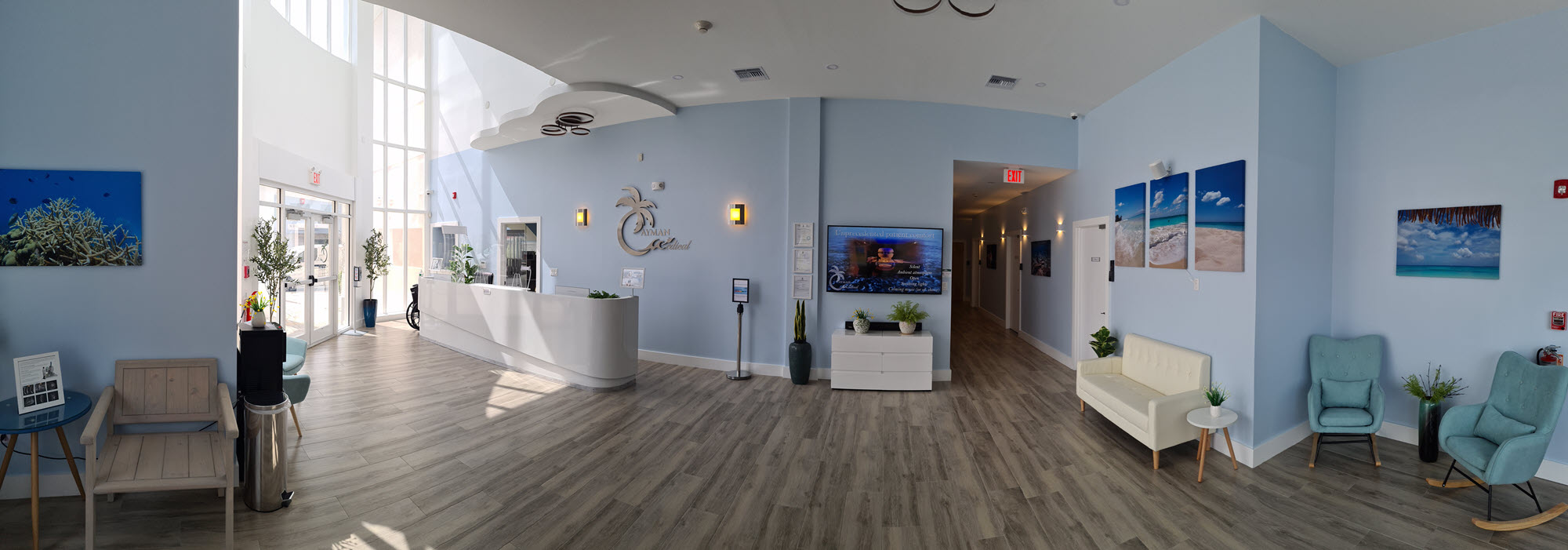

Cayman Kinetic MRI - Advanced Imaging for the Active Body
Offering unique MRI services in the Cayman Islands:
- Weight-bearing & in-motion imaging for spine, knees, and other joints
- Open and comfortable design - no tunnels, no stress
- Perfect for athletes, dancers, and active individuals
- Expert interpretation by fellowship-trained radiologists
- Integrated physiotherapy & regenerative treatment options
-
What makes Cayman Kinetic MRI different from a regular MRI?
Unlike standard MRI scanners, the Cayman Kinetic MRI allows imaging in standing, sitting, or in-motion positions. This means we can visualize how your joints, spine, and muscles behave under real-life, weight-bearing conditions - something traditional MRI cannot capture. It's especially valuable for athletes and active individuals where movement matters.
-
How does a "weight-bearing" MRI help athletes?
Sports-related injuries often appear only when a joint or spine is under stress. A weight-bearing MRI shows how your body reacts under load - such as when standing, running, or bending - helping to pinpoint issues that may be missed when lying flat. This helps leading to more accurate diagnoses, faster recovery plans, and better treatment outcomes.
-
Is Cayman Kinetic MRI safe?
Yes. It uses the same proven, non-invasive magnetic technology as standard MRI, but in an open, comfortable environment. There is no radiation exposure, and scans are performed by trained technologists under physician supervision.
-
Who can benefit from Cayman Kinetic MRI?
Ideal for:
- Athletes and fitness enthusiasts
- Active individuals with joint, back, or soft-tissue pain
- Post-surgical patients requiring follow-up evaluation
- Physiotherapy and orthopedic cases focused on biomechanics
- Medical tourists seeking advanced imaging and private recovery -
Is the MRI open or enclosed?
Our MRI is open-style - meaning you are not placed inside a tunnel. This greatly reduces claustrophobia and discomfort, allowing you to move naturally during dynamic imaging.
-
What body parts can be imaged in motion?
Dynamic and weight-bearing scans can be performed for:
- Spine (lumbar and cervical)
- Knees, hips, and ankles
- Shoulders and upper extremities
- Pelvis and other joints under motion or stress -
How long does a Cayman Kinetic MRI scan take?
Most scans take 30-60 minutes, depending on the region and whether dynamic sequences are included. Adding the kinetic part, adds around 15-30 minutes. Our technologists will guide you through each step and ensure your comfort throughout.
-
Will my doctor accept or use these results?
Absolutely. Your MRI images and radiology report are prepared by in-house US board-certified radiologists and are compatible with reports physicians, orthopedic surgeons, chiropractors, and physiotherapists need. Reports can be sent directly to your care team for coordinated treatment.
-
Do I need a referral?
While referrals from a physician or chiropractor are welcome, self-referrals are also accepted. Our medical team can review your case and recommend the most appropriate imaging protocol.
-
How can I prepare for my Cayman Kinetic MRI appointment?
Wear comfortable, metal-free clothing. You'll be asked to remove jewelry, watches, and phones before the scan. For dynamic studies, wear or bring flexible athletic wear that allows natural movement.
-
Is it covered by insurance?
Many local and international insurance plans cover MRI scans. We'll help you verify your benefits and can also provide self-pay and tourism packages if needed.
-
How do I book an appointment?
Schedule your scan by calling (+1 345) 623-1000, messaging us on WhatsApp (+1 345) 326-1000, or booking online.
Walk-ins and urgent same-day slots are available for acute sports injuries.
Specialty MRI Services
From "Head to Toe"
Head & Neck Imaging
Brain, Orbits, Internal Aditory Canal (IAC), Sella (Pituitary), Temporomandibular Joints (TMJ), Neck
Spine Imaging
Craniocervical Junction, Cervical Spine, Thoracic Spine, Lumbar Spine, Sacrum, Sacroiliac joints
-
What is Magnetic Resonance Imaging (MRI)?
Magnetic Resonance Imaging (MRI) is an imaging procedure that uses strong magnets and radio-frequency pulses to generate signals from the body. These signals are processed to create very detailed images of the body. No harmful radiation is used.
-
What to expect during your MRI?
You will be asked to complete a safety questionnaire to make sure you can be scanned safely.
It might be necessary to change your clothing prior to the exam if it contains metal. You are welcome to bring your own comfy dress such as pajama or cotton shorts.
Most of the time, you will have visual and communication contact with the technologist - for a higher comfort level.
During the exam, you will be surrounded by ambient lights which help you relax. Most patients fall asleep or simply doze off during the exam.
To increase your comfort level, we play soothing melodies and sounds or you can even choose your own music.
The body part that is being examined will be placed in the center of the scanner. You may be positioned in such a way to better see the anatomy. The scanner may move and you may be scanned lying down or standing up. You may be asked to change positions during the exam. The technologist will explain to you what you will be doing before and during the exam.
A coil will be applied to the body part that is being imaged. There may be sponges or straps to help position you. You will need to remain still.
The machine will make some mild buzzing or knocking sounds, which usually do not exceed ordinary room noise levels. The technologist will speak to you periodically.
The exam may require an injection of contrast. The contrast is called Gadolinium. It may be injected into a vein. If you are having an arthrogram, you will have an injection of contrast into the joint. The contrast provides the radiologist additional information. This information may be necessary for a better diagnosis.
There will be a series of exams ranging from 3 minutes-8 minutes. The technologist will communicate with you between each exam.
The exam is usually painless. A specialized doctor, called a radiologist, reads these images and the report is sent to your doctor. Your doctor will explain your results to you at your follow up exam. -
How long does an MRI exam take?
An exam may take 30 minutes to an hour, depending on the exam.
-
What are the risks? Is MRI safe?
MRI is generally safe. There are no known side effects. You will be asked to complete a safety questionnaire. There are certain metallic and electronic implants that cannot be scanned safely or only scanned under certain situations. Pregnant patients can be scanned with special precautions. There is a small risk of allergic reaction to the contrast. You will be given a medication guide prior to the administration of intravenous contrast. If you are on dialysis or have severe kidney disease, your doctor may need to draw labs before you have intravenous contrast.
Please find below further MRI safety information and screening forms:
General MRI Information
MRI Contrast Guide
MRI Screening & Consent Form -
Is this MRI suited for children and elderly?
This open and silent MRI is especially suited for young patients/children and elderly patients. Parents or loved ones may sit in the same room with the patient, providing a higher comfort level during the entire exam.
-
How can I make an appointment?
Please give us a call at 623-1000 to schedule an appointment or send us a message via our CONTACT FORM.
Our Staff
Roland Talanow, MD PhD
DIAGNOSTIC RADIOLOGIST
Dr. Talanow is a US board certified radiologist who completed his Radiology residency as well as a Nuclear Medicine fellowship at the Cleveland Clinic in Cleveland/Ohio, USA.
Dr. Talanow is highly involved in medical education and research, particularly in the field of Radiology together with a broad international network of health experts.
Aside being Series Editor of a Radiology book series, Dr. Talanow also authored several specialty/radiology books as well as several books about the United States Medical Licensing Examination.
Dr. Talanow fulfills a position as affiliated professor at the University of Bern/Switzerland, as well as Editor-in-Chief of a PubMed indexed international medical journal.
Over the last 20 years of his career, Dr. Talanow held numerous presentations and publications and received multiple awards from national and international medical societies.
He continues to focus his work on medical education and developed many web-based programs that serve this purpose. (Some examples: 1, 2, 3, 4)

US board certified, society awarded Medical Doctor, providing a broad spectrum of Radiology services in the Cayman Islands with focus on Magnetic Resonance Imaging (MRI), especially Neuro, Spine and Musculoskeletal imaging.
Book an appointment or second opinion readNon-Physician Staff

